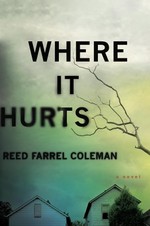It’s Publication Day for Where It Hurts, so I thought I’d better throw this up again. Go get your hands on it.
—
 Where It Hurts
Where It Hurts
Series: Gus Murphy, #1
ePub, 353 pg.
G.P. Putnam’s Sons, 2016
Read: November 26 – 27, 2015

I honestly don’t know where to start with this, once again Reed Farrel Coleman has provided me with a book that I really want to talk about, but I’m not sure how to proceed, beyond saying that this is really good.
Where It Hurts is gritty, bleak, tragic, and tense with a strange sense of hope filtering though the depression, pain and grief. If that miasma makes sense to you, you’ll get the feel for this book. If it doesn’t, you’ll understand why I struggled for almost a month with this.
Gus Murphy is a retired uniformed police officer — retired young, I should add. His life has been shattered by a calamity that struck without warning and without mercy; bringing an end to his career, his marriage, his faith, and his relationship with his daughter. His ex-wife and daughter aren’t faring too well in the aftermath, either — you could make the case that Krissy, his daughter, is worse off than Gus.
Two years after his world came to an end, it’d be nice to say that Gus has started to put his life back together — he hasn’t. He has, however, figured out how to exist, and honestly that’s about it.
It’s into this state of mind, state of being that we first encounter Gus and from there Where It Hurts really gives us two stories. The first is a story about an ex-cop being asked (and agreeing) to look into a months-old homicide on behalf of a father — who has a record long enough that the Suffolk County PD isn’t that interested in helping him or taking any evidence he might have gathered for them. Enter Gus. The other is a story of a grieving father dealing with the aforementioned fallout of the tragedy and — thanks to other story — a renewed interest in life beyond this grief and anger. In the end, both stories end up feeding the other as Gus remembers what living was like, what being a cop was like.
As well-written and plotted as book is — with a well-done mystery, your appreciation for this book will come down to the question of what you think of Gus. If you don’t care about him, aren’t interested in what makes him tick — the rest isn’t going to maintain your interest. If you do care, are curious, are sympathetic, are fill-in-the-blank, there’s no reason you won’t be satisfied with it.
I’ve only read 5 or so of Block’s Matthew Scudder books — and that was a while ago — but Gus reminded me a lot of Scudder. Instead of battling his addiction, he battled his loss (and, yes, I realize both are probably doing the same thing — but Scudder identifies as a drunk, Gus doesn’t). I found it particularly interesting — and on the whole, original — the way that Coleman dealt with and explored Gus’ lack of faith. Because it’s not just your garden variety atheism/agnosticism — Gus is angry about his God not existing anymore (or at least his faith in Him). He talks about it a lot — so much so that you know it’s self-delusion to think of it as a loss of faith, while it’s anger at God for what happened to him. Gus isn’t Job, he has neither the patience or the faith to react like Job — and in his grief, he lashes out at the God who would do this to him/his family. To me, this felt genuine, I think I know this guy (or at least that reaction).
The supporting characters were great — the criminals suspected of the murder, the criminals adjacent to the murder, the police (although one bordered on being a cartoonish lout — but that seemed intentional), the people from Gus’ old life, those from his new. On the one hand, I didn’t think I got a great picture of his ex-wife, but on the other, I don’t think I needed to. A little more time with Krissy, however would’ve been good. Everything else was great, character-wise.
That was actually much easier than I thought it would’ve been. Where It Hurts strikes me as the kind of book that I could go on and on for pages about, but apparently not today. It might have to wait until book two comes out, so I can see where Gus goes from here. Does he remain in essentially the same spot, or does he make big, sustained steps out of mere existence and into a new life? The last few pages suggest that he does, but I know better than to expect that to remain the case. I actually could see me revising everything I said here about this book based on the sequel.
Regardless, a heckuva book — one that could appeal to thoughtful mystery readers, or general fiction readers willing to have a hefty dose of crime in their reads.
—–

—–
Note: I received a digital copy of this book from the nifty people at First to Read, as grateful as I am to them, that didn’t alter my appreciation of the book or what I said about it.

